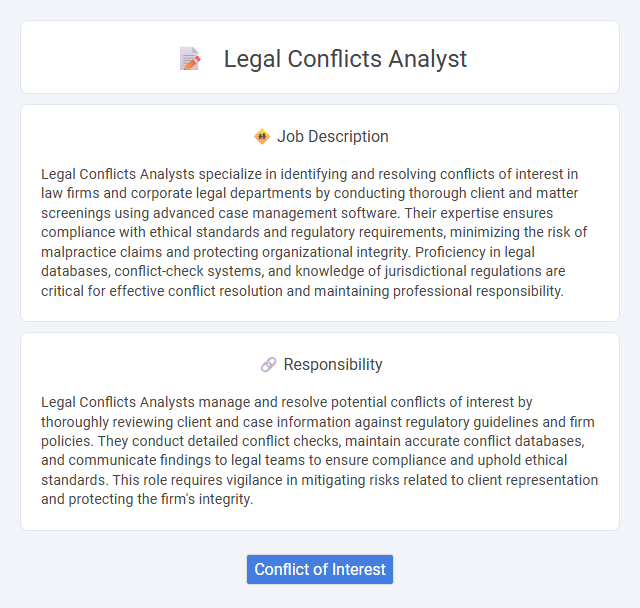
Legal Conflicts Analysts specialize in identifying and resolving conflicts of interest in law firms and corporate legal departments by conducting thorough client and matter screenings using advanced case management software. Their expertise ensures compliance with ethical standards and regulatory requirements, minimizing the risk of malpractice claims and protecting organizational integrity. Proficiency in legal databases, conflict-check systems, and knowledge of jurisdictional regulations are critical for effective conflict resolution and maintaining professional responsibility.
Individuals with strong analytical skills and attention to detail are likely to excel as Legal Conflicts Analysts, as the role demands thorough examination of legal documentation and identification of conflicts. Those who are comfortable working independently under pressure and navigating complex ethical considerations may find this job particularly suitable. Candidates who prefer collaborative environments or struggle with intense focus might face challenges in this position.
Qualification
Legal Conflicts Analysts must possess a law degree or paralegal certification with extensive knowledge of conflict-checking procedures and legal ethics. Proficiency in legal research software and case management systems is essential for analyzing potential conflicts of interest in client and case information. Strong analytical skills and attention to detail enable effective identification and resolution of conflicts to ensure compliance with regulatory requirements.
Responsibility
Legal Conflicts Analysts manage and resolve potential conflicts of interest by thoroughly reviewing client and case information against regulatory guidelines and firm policies. They conduct detailed conflict checks, maintain accurate conflict databases, and communicate findings to legal teams to ensure compliance and uphold ethical standards. This role requires vigilance in mitigating risks related to client representation and protecting the firm's integrity.
Benefit
A Legal Conflicts Analyst likely offers significant benefits by ensuring compliance with legal and ethical standards, reducing the probability of conflicts of interest that could result in costly litigation or reputational damage. Their role probably improves operational efficiency by streamlining the review process and maintaining accurate conflict of interest databases. Organizations may benefit from enhanced decision-making and risk management, promoting overall corporate governance and trust.
Challenge
A Legal Conflicts Analyst position likely presents the challenge of meticulously identifying and resolving potential conflicts of interest within complex legal frameworks. The role may require balancing confidentiality and compliance while coordinating among multiple stakeholders to maintain ethical standards. Navigating constantly evolving regulations and diverse case details probably demands sharp analytical skills and adaptability.
Career Advancement
Legal Conflicts Analysts play a critical role in identifying and resolving conflicts of interest within law firms and corporate legal departments, ensuring compliance with ethical standards. Mastery of conflict checking software and keen attention to detail can lead to promotions into senior analyst or compliance officer roles. Career advancement often involves acquiring certifications in legal compliance and gaining expertise in risk management to move toward managerial positions or specialized legal consulting.
Key Terms
Conflict of Interest
Legal Conflicts Analysts specialize in identifying and resolving conflicts of interest to ensure compliance with ethical and regulatory standards within law firms. They conduct thorough conflict checks by analyzing client and case data to prevent legal malpractice and maintain professional integrity. Proactive management of conflicts of interest mitigates risks, protects client confidentiality, and upholds the firm's reputation.
 kuljobs.com
kuljobs.com